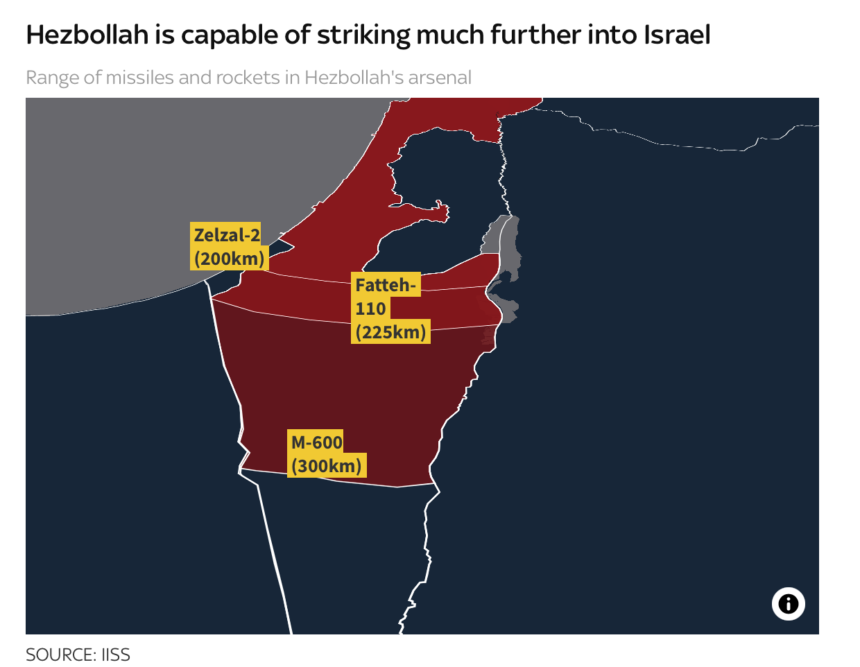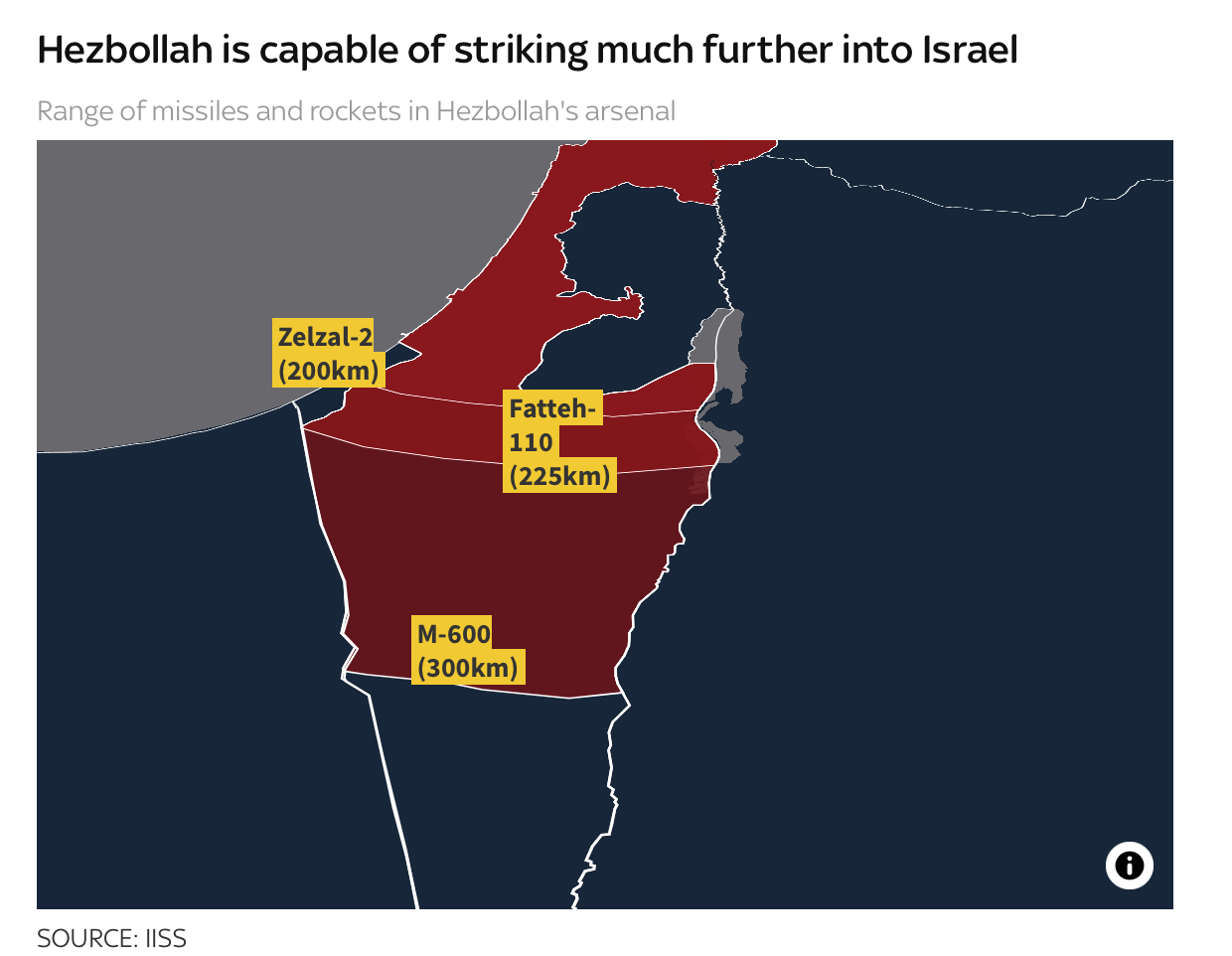The escalation of attacks by Hezbollah and Yemen on Israel feels like more than just a short-term increase, but we’ll need to track the pace over the next week or more to know for sure, but on the surface it looks like the Houthis and Hezbollah are stepping up their operations and that this renewed effort is likely to be sustained.
For a quick check, see the below news updates from reputed media outlets The Hindustan and Times of India.
There appear to have been additional attacks by Hezbollah since these videos were filmed.
Hezbollah launched its first missile attack on the Israeli town of Tsurial. pic.twitter.com/KqPGp5mduD
— Sprinter (@SprinterFamily) July 23, 2024
This account is based on breaking news, so please forgive me for not giving too much background.
The immediate cause of Hezbollah’s attack, as the Hindustan Times confirms in the headline above, is retaliation for Israel’s response to last Friday’s Houthi drone attack on Tel Aviv, which was clearly a significant escalation from Israel’s point of view, destroying homes and causing deaths.
National, Israel, Yemen prepare for escalating war as hostilities escalateThe article summarises Israel’s retaliation by attacking a Yemeni port city and blowing up fuel storage tanks. The port also receives humanitarian aid, and many reports have indicated Israel intends to restrict food supplies to Yemen, which has been hit by food shortages and a cholera epidemic during its war with Saudi Arabia. From Kunitachi:
Houthi-controlled areas braced for routine missile, drone and aircraft attacks on Sunday after Israel carried out the first airstrikes in Yemen since the war in Gaza began.
Residents of Houthi-held Hodeidah woke to thick plumes of black smoke in the sky above the port city, while air raid sirens sounded in Eilat, Israel.
Yemenis and Israelis now face a broader war between the two countries.
Residents of Hodeidah told The National that the entire city was engulfed in smoke, with the smoke getting thicker as they approached the port, hours after Saturday’s Israeli counterattack, which set fuel depots ablaze and stained parts of the skyline in red and black flames.
One might wonder why Ansar Allah decided to attack Tel Aviv at the time that it was likely to provoke an Israeli counterattack. I see no need to think beyond “because it was possible.”
The Houthis are adamant about punishing Israel and the shipping that reaches them until Israel stops its carnage in Gaza, and Israel absolutely intends to continue the carnage. The Houthis have implemented new tactics with increasing success, including low-tech ploys like sending drone boats packed with explosives into ships. But they claim to be stepping up their rocket warfare with new weapons. Whether they are homegrown or supplied by friends seems less important than the result: the Houthis can and do inflict more pain on Israel.
Lebanese Hezbollah-affiliated media reported that the Houthis showed off new, advanced, long-range weapons that cannot be intercepted and plan to carry out further operations against Israel. They are also targeting offshore gas fields, power plants and oil facilities.
— Eretz Yisrael 24 (@EretzYisrael24) July 23, 2024
One question is why Hezbollah decided to step up its attacks now, especially with Netanyahu in parliament this week, which would likely prompt Netanyahu to seek U.S. support.
But none other than Chairman of the Joint Chiefs of Staff Charles Brown has already told Israel that the United States has little to offer in terms of help. From the Jerusalem Times in late June:
Chairman of the Joint Chiefs of Staff Charles Q. Brown warned Monday that the United States may not be able to help protect Israel from an all-out war with Hezbollah in the same way it intervened during an Iranian drone attack in April.
The statement has a deeper meaning than meets the eye.
In the conflict Brown describes, Israel first attacked the Iranian embassy in Beirut, killing seven staff members, including a senior Iranian Revolutionary Guards officer.
Iran and the US then effectively negotiated what the US saw as face-saving retaliation: Iran would target only specific military sites. In other words, Israel and the US knew full well what was coming.
Iran first sent in a large number of very slow-moving drones, all of which were shot down by the US, Israel and France. But this response allowed Iran to determine where its air defenses were operating from. Then Iran sent in missiles, all of which missed, aimed at two of Israel’s most heavily guarded airbases. Scott Ritter, who worked extensively with the Israel Defense Forces in the 1990s, considered this a conclusive demonstration of Iran’s ability to penetrate the combined US-Israeli defenses under textbook Israeli conditions.
Israel should therefore have realized that nothing short of nuclear weapons could protect it from a serious attack from Iran.
By asking Israel to ship eight Patriot systems to Ukraine, and by telling all Patriot users that Ukraine was their top priority for deliveries of the new missiles, the United States further emphasized its message to Israel that there was “actually not much we could do.” Even if the United States and Israel knew these systems were dormant, Israel might want them as backups or parts, and the message that it was not at the forefront of new Patriot missiles was hard to misinterpret.
An article about the increasingly precarious state of the Israeli economy is long overdue, but even Israel’s most fervent Western media is being forced to acknowledge the weakening of its military. Indeed, the most commentary has come from independent media. Retired Colonel Larry Wilkerson has, in a surprisingly roundabout way, described Israel as having lost 10% of its forces, the threshold at which the army loses its fighting capability (though not immediately, and on a set trajectory).1 Scott Ritter points out that while the reported IDF death toll is not that high, the irreparable losses (such as serious injuries) are very high. He adds that the IDF was never a large army to begin with, and replacing losses with new recruits is not a good idea.
Israel acknowledges it has a tank shortage. By Elijah Magnier 2 days ago:
Israeli occupation forces commander Gen. Helgi Halevi acknowledged the protracted conflict has left it with serious shortages of tanks and ammunition, and pressed Prime Minister Benjamin Netanyahu to seek an end to the war that has already lasted 10 months. It is the first time that the Middle East’s most powerful military has acknowledged significant losses of tanks, tank crews and commanders who have been wounded or killed in battle.
Particularly shocking is the announcement that a significant number of tanks have been decommissioned, and the lack of a training program for the personnel and resources required to maintain them. According to an article published by the Israeli newspaper Maariv, Israel has admitted that over 500 armored vehicles of various types and their crews have been damaged since October 7. Meanwhile, Al-Qassam has announced that it has attacked over 1,000 tanks and armored vehicles within the Gaza Strip.
Hezbollah and Israel have recently engaged in retaliatory attacks along the border so extensive that between 60,000 and 100,000 settlers (depending on who counts) have been forced to leave or be evacuated from Israeli border towns and housed at government expense. Hezbollah has said the attacks will not stop until Israel ends the Gaza war.
Israel has the audacity to demand that Lebanon withdraw to the Litani River, i.e. abandon Lebanon, to allow settlers to return in peace – a demand that Israel only briefly reached during the failed 2006 war. Hezbollah leader Nasrallah has flatly rejected, saying Lebanon will not cede territory to Israel.
It should be remembered that Lebanon has long resentment over Israel’s occupation of the former Lebanese region of Shebaa Farms, which Hezbollah regularly shelled even before October 7.
Additional accounts:
Israel faces tank and ammunition shortages as economy plummets https://t.co/cQufoYYtWw pic.twitter.com/tKjGa9gMBK
— Electronic Intifada (@intifada) July 22, 2024
#Palestine / #Israel 🇵🇸🇮🇱: Al-Qassam Brigades (#Hamas)teeth, #IDF Merkava tank #Rapha, #Gaza.
The group appears to have used a RPG-7 type launcher equipped with locally manufactured “Al-Yassin-105” tandem anti-armor rounds. pic.twitter.com/GG1LOjfVAe
— War Noir (@war_noir) July 22, 2024
So, propaganda videos like this one are not completely exaggerated.
Hezbollah to Israel: You won’t have any more tanks left. pic.twitter.com/74Muy2YygU
— Warintel (@warintel4u) July 22, 2024
Now that that long preamble is out of the way, let’s get back to the topic of Hezbollah’s actions. Sky News, which is clearly not sympathetic to the Axis of Resistance, Hezbollah is preparing for war and is shifting its tactics against Israel amid global alarm. So far, Israel claims to be winning the border battle against Hezbollah (all information seems to come from the Israeli side, so it’s best to take it with a pinch of salt). The article also features some great infographics and fun facts, such as:
As we join, there appears to be an increase in tit-for-tat attacks between Israeli forces and Lebanon’s Iran-backed Hezbollah militant group.
It is too early to draw conclusions, but a first guess is that Ansar Allah is escalating relentlessly with growing capabilities, while Hezbollah senses an opportunity. At the very least, it is clear that Hezbollah will not be deterred by Netanyahu’s attempts to sway it to further retreat from an overstretched U.S.
_____
1 I couldn’t find Nima’s part of the Dialogue Work, but I listened to the relevant part twice to make sure I heard it correctly. Wilkerson begins by saying that he has new information about IDF losses, implying that they are worse than generally known, without giving any figures. He then quickly goes on to discuss Operation Barbarossa, where the gist is that the Germans lost 10% of their forces in that operation, which was enough to seal their fate.









